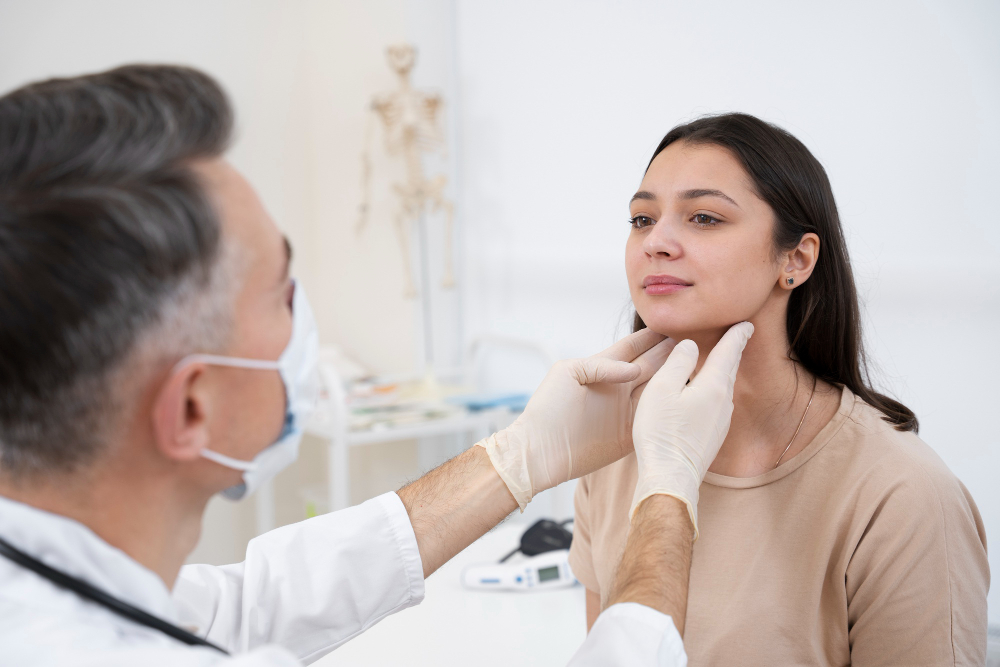
Endocrinologists specialize in treating disorders of the endocrine system, the network of hormone-producing glands in the body. Endocrinologists are specialty trained internal medicine physicians who treat conditions such as dysfunctions of the thyroid, the parathyroid glands, the adrenal glands, the pituitary, bone metabolism as well as issues involving insulin such as PCOS, hypoglycemia and diabetes mellitus.
- Thyroid nodules
- Thyroid cancer
- Goiter
- Grave’s Disease
- Hashimoto’s Thyroiditis
- Hyper- and hypoparathyroidism
- Parathyroid cancer
- Prolactinoma
- Acromegaly
- Hypopituitarism
- Hypogonadotropic hypogonadism
- Adrenal lesions
- Hyperaldosteronism
- Pheochromocytoma
- Adrenal insufficiency
- Endocrine hypertension
- Insulin resistance
- PCOS
- Hypoglycemia
- Diabetes mellitus
- Osteoporosis
Meet Our Endocrinology Team
Jennifer Lawrence, MD
Endocrinologist
Jennifer Lawrence, M.D completed her medical degree at the Johns Hopkins University School of Medicine, her Internal Medicine residency at the Johns H...
Read MoreJennifer Lawrence, MD
Endocrinologist
Jennifer Lawrence, M.D completed her medical degree at the Johns Hopkins University School of Medicine, her Internal Medicine residency at the Johns Hopkins Hospital in Baltimore, and her fellowship in Endocrinology and Metabolism at Brigham and Women’s Hospital, Harvard Medical School. She has published in the areas of thyroid disease, thyroid disease in pregnancy, and endocrine hypertension.
In 2000, she joined her husband and rheumatologist, Dr. William Tidmore in Valdosta. Together they established the Valdosta Specialty Clinic, alongside Valdosta Family Medicine Associates. In 2000, she was also instrumental in founding the SGMC’s Diabetes Management Center where she consistently achieved recognition for delivering high-quality diabetes care by the National Center for Quality Assurance (NCQA). After 24 years of dedicated service at both clinics, Dr. Lawrence transitioned her full-time practice to Valdosta Specialty Clinic in June 2024 to focus on diseases of the thyroid, parathyroid, pituitary, adrenal, and metabolism.
Dr. Lawrence has been active in medical societies over her career serving on the board of directors and as a past president of the Georgia Chapter of the American Association of Clinical Endocrinology, on the editorial board of Endocrine Practice, and is an active member of the American Thyroid Association currently serving in the Clinical Affairs committee. She has been a volunteer for the Oxalosis and Hyperoxaluria Foundation, as a speaker, as a patient advocate, writing the published Patient Perspective to accompany the white paper for primary hyperoxaluria. She serves as the sub-specialty coordinator for Endocrinology for the MUSM-SGMC internal medicine residency program.
Physician Assistants
Lela Allen, PA-C
Lela Allen is a Physician Assistant who is originally from Moultrie, GA. She completed undergraduate studies at Valdosta State University. She then ...
Read MoreLela Allen, PA-C
Lela Allen is a Physician Assistant who is originally from Moultrie, GA. She completed undergraduate studies at Valdosta State University. She then transferred to the Medical College of Georgia in Augusta and completed her Physician Assistant training in 2001. Prior to joining Valdosta Specialty Clinic to work with Dr. Jennifer Lawrence, she has worked in Family practice, Neurology, and at The South Georgia Medical Center Diabetes Management Center.
Her passions include medical missions, aiming for overall wellness in patients with Diabetes, and being a wife and a mom to three boys.
Mrs. Allen is certified through the National Commission on Certification of Physician Assistants (NCCPA). She is a member of the Georgia Association of Physician Assistants (GAPA).
Carrie Bowling, PA-C
Carrie Bowling, PA-C is a Physician Assistant who is originally from Valdosta. She received a Bachelors of Arts and Sciences in Biology from Valdosta...
Read MoreCarrie Bowling, PA-C
Carrie Bowling, PA-C is a Physician Assistant who is originally from Valdosta. She received a Bachelors of Arts and Sciences in Biology from Valdosta State University in 1999. She then completed her Physician Assistant training at the Medical College of Georgia in 2002. Since then she has worked with Dr. Jennifer Lawrence at Valdosta Specialty Clinic and formerly at the South Georgia Medical Center Diabetes Management Center.
Ms. Bowling is certified through the national Commission on Certification of Physician assistants (NCCPA). She is a member of the American Academy of Physician Assistants (AAPA) and Georgia Association of Physician Assistants (*GAPA) and American Society of Endocrine Physician Assistants (ASEPA).
Physician associates/physician assistants (PAs) are licensed clinicians who practice medicine in every specialty and setting. They are trained to practice medicine using a curriculum modeled on medical school education and work closely alongside physicians to provide quality care. Trusted, rigorously educated and trained healthcare professionals, PAs are dedicated to expanding access to care and transforming health and wellness through patient-centered, team-based medical practice.
